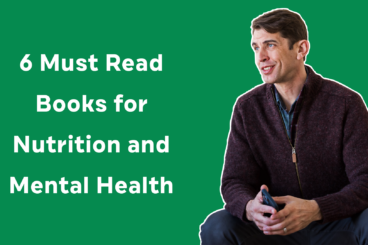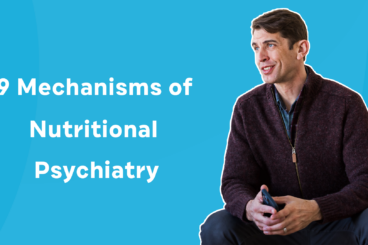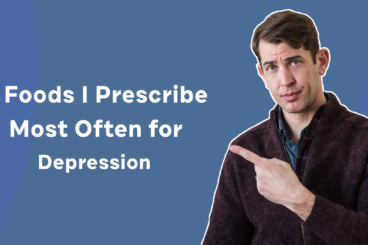Table of Contents
We know the holiday season can be an emotional time. It’s a time when we are with family and we’re sitting with everything that’s happened over the year which includes a lot of victories, but also a lot of grief, struggles and challenges. So the holidays present us with opportunity to really focus on taking care of our mental health with food.
It is an emotional time and it’s also a time when there’s a lot of sugar, a lot of butter, a lot of big meals, and a lot of guilt about overeating. There’s an opportunity for a lot of connection with family, friends and community. The holiday season is a really important time for us to think about how our food and food planning can really fit into taking care of our mental health.
#1 Culprit is sugar
So let’s start with the number one culprit and nutrient of concern, which is sugar. It’s all the cookies, pastries, cakes and fun, delicious stuff. Sugar really can creep into anyone’s holiday eating plan. So how do we deal with that? We go back to basic nutritional psychiatry rules, which means we look at nutrient density and focus on those sweet treats that are great for our brain health because they bring a lot of nutrients with those calories.
Choose dark chocolate
That’s why in nutritional psychiatry and the Mental Fitness Kitchen as well as all my recipes, you’re going to see lots of dark chocolate. Dark chocolate means you’re getting more cacao. That’s the bean that chocolate comes from and cacao brings with it magnesium, iron, fiber and lots of phytonutrients. So upgrading from milk chocolate or even white chocolate to dark chocolate is a nice move for more nutrient density to feed your mental health. On top of that, when it comes to cookies and treats, looking to add in more fruits, seeds and nuts is really a nice way to add in more nutrients. Certainly, we all like a nice sugar cookie, but also making sure that your cookie tray has lots of dark chocolate, nuts and seeds, and more nutrient dense treats, can be a nice move in terms of feeding your mental health this holiday.
Alcohol-free
Number two culprit? Alcohol. The holiday season is emotional for a lot of people struggling. It’s a time when people tend to not only eat their feelings but drink their feelings and holiday parties are notorious for having a lot of booze. I’m all for people having responsible fun, but alcohol is a central nervous system depressant, and especially when there’s a lot going on, it can really take someone’s holiday mood. That’s where there are some swaps that I find very useful in my own life. When I talk with patients about their holiday plan, it’s helpful to think about more drinks that are alcohol free like kombucha or alcohol free spirits, or even herbal teas to end the night. This is a way to minimize alcohol consumption or for some people, just eliminate it altogether. The idea is that less alcohol is going to lead to less mood liability, less depression, and less anxiety.
Focus on vegetables
Another important thing to focus on in your holiday season is adding in more plants. So often we focus on the main dishes and we don’t think about all those amazing, wonderful and delicious holiday sides. A little swap that I think is quite important is to start using more olive oil. You don’t need to get rid of all of your butter or other cooking fats, but vegetables and olive oil are just a great combination for your brain health and your mental health. They’re also easy to cook for a big group or a big family. Getting a big sheet of oven roasted vegetables out is just an easy, delicious, nutrient dense dish. A great way to add in more vegetables is by adding to more soups, stews and broths. That is a common dish in our household in the winter. It is easy, satiating, and doesn’t give you that kind of holiday heaviness and fullness.
Healthy breakfasts A final thought is thinking about breakfast. Those next days after a big holiday meal can be tough. And that’s where having a set of nice late breakfasts that are filling but also nutrient dense and good for your mental health is key. Some top choices would be doing something like a vegetable frittata with a fruit salad. That is easy to prepare for beforehand, is nutrient dense and good for fighting all the stuff that we’re trying to fight when we eat for mental health. I hope that these tips help you think about holiday eating and really create a plan for yourself to get more nutrient density, less alcohol, less sugar and enjoy the time more.




Thank you very much for making this information regarding brain health and nutrition easy to read and understand.
I can’t express how deeply grateful I am to have found your “Eat to Beat Depression and Anxiety” book! I have listened to it on Audible at least a dozen times! The small changes I have made for me and my family are absolutely life changing for both me and my kids!!! I am still working on my stubborn husband LOL!!
I can NOT believe that this is so overlooked in the treatment of mental health!!! Or taught in school!?!? How are we never taught how to nourish our brains for optimal function!?!?! Just wanted to let you know what a giant impact this book has had on my life! Much love to you Dr. Ramsey! Thank you for sharing your knowledge!